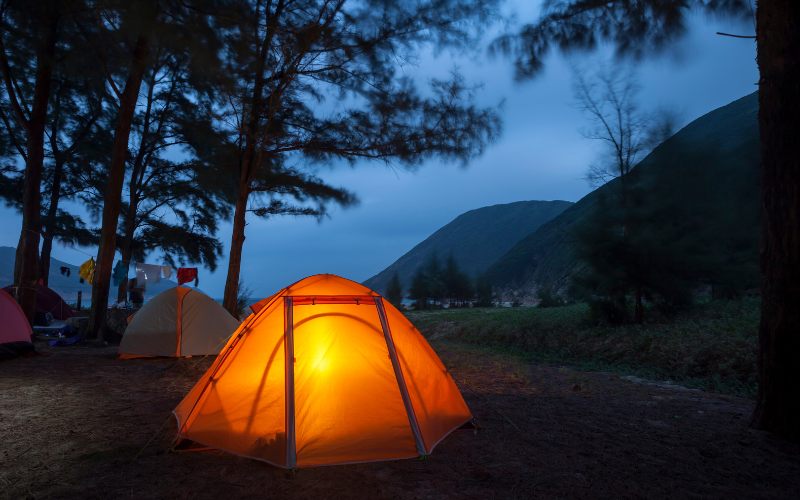If you’re planning a camping trip and want to stay warm during the chilly nights, you might be wondering if it’s safe to use a propane heater in your tent.
Propane heaters can provide efficient heat and are a popular choice for camping, but there’s a few things to think about before you go using one in your tent.
First and foremost, safety should be your top priority when using a propane heater in a tent.
Propane heaters produce carbon monoxide, which is a colorless, odorless gas that can be deadly if inhaled in high concentrations.
It’s important to ensure that your tent is properly ventilated and that you have a carbon monoxide detector installed to prevent any potential risks.
Additionally, you need to make sure that you choose a propane heater that is designed for indoor use and has the necessary safety features, such as tip-over protection and low oxygen shutoff.
Below we’ll explore the topic of using a propane heater in a tent and give ya some tips on how to safely use one to stay all warm and cozy during your camping trip.
Safety Precautions

Using a propane heater in a tent can be safe as long as you take some basic safety precautions.
Here are some tips to keep you and your fellow campers safe:
Ventilation
Propane heaters emit carbon monoxide, which can be deadly if inhaled in large amounts.
To avoid carbon monoxide poisoning when using the propane tent heater, make sure your tent is well-ventilated.
Keep the tent door or window slightly open to allow fresh air to circulate.
Also, avoid putting your heater in an enclosed space like a closet or small tent.
Ideally, you’d want this in the middle of your tent, about one to two feet away from its walls.
Fire Hazards
Propane heaters can also pose a fire hazard if not used properly.
To avoid starting a fire, keep the heater away from anything flammable like clothing, blankets, or paper.
Also, never leave the heater unattended, especially if there are children or pets in the tent.
Always turn off the heater when you leave the tent or go to sleep.
Additionally, it’s important to make sure your heater is level and stable to prevent it from tipping over.
Most propane heaters come with safety features like an automatic shut-off switch that turns off the heater if it’s knocked over.
Make sure to read and follow the manufacturer’s instructions for your specific heater.
Finally, it’s always a good idea to have a fire extinguisher on hand in case of an emergency.
Make sure everyone in your camping party knows how to use it.
Types of Propane Heaters
Propane heaters are a popular choice for camping, especially during the colder months.
They are efficient and provide a good amount of heat.
However, there are different types of propane heaters, and it is essential to understand each one to choose the best one for your needs.
Here are the two main types of propane heaters:
Catalytic Heaters
Catalytic heaters are a type of propane heater that uses a catalytic converter to produce heat.
They are designed to be used indoors and outdoors and are excellent for camping.
They are also known as flameless heaters because they do not have an open flame.
Instead, they use a chemical reaction to produce heat, making them safer than other types of propane heaters.
Catalytic heaters are also known for their fuel efficiency.
They use less propane than other types of heaters and can run for a long time on a single tank.
They are also easy to use and maintain.
Radiant Heaters
Radiant heaters are another type of propane heater that is commonly used for camping.
They use a flame to produce heat and are designed to heat up a specific area.
They are also known as directional heaters because they can be pointed in a specific direction to heat up a particular area.
Radiant heaters are not as fuel-efficient as catalytic heaters, but they are still an excellent choice for camping.
They are easy to use and provide a good amount of heat.
However, they do pose a fire hazard if not used properly.
It is essential to read the instructions carefully and follow all safety precautions when using a radiant heater.
Choosing the Right Propane Heater
- 4, 000, 9, 000, or 18, 000 BTU per hour
- Heats up to 450 sq. ft.
- Hi-Med-Low heat settings
- Automatic low oxygen shut-off system (ODS)
Last update on 2025-04-24 at 16:54 / Affiliate disclosure / Images & pricing from Amazon Product Advertising API
Tent Size
The first thing to consider when looking for a propane heater for your tent is the size of your tent.
Larger tents will require more heat to keep them warm, so you’ll need a heater with a higher BTU output.
A good rule of thumb is to choose a heater with at least 3,000 BTUs per 100 square feet of tent space.
So, if you have a 10×10 tent (100 square feet), you’ll need a heater with at least 3,000 BTUs.
If you have a larger tent, you’ll need a heater with a higher BTU output to keep it warm.
Heater Size
The size of the heater you choose will depend on how many people will be sleeping in the tent and how cold it will be outside.
If you’re camping alone or with one other person, a small heater will suffice.
However, if you’re camping with a group of people, you’ll need a larger heater to keep everyone warm.
It’s important to choose a heater that is the right size for your tent, as a heater that is too small won’t be able to keep the tent warm enough, while a heater that is too large will waste fuel and could be dangerous.
Fuel Consumption
Another important factor to consider when choosing a propane heater for your tent is fuel consumption.
Propane heaters can consume a lot of fuel, especially if you’re using them for an extended period of time.
It’s important to choose a heater that is fuel-efficient, so you don’t have to keep refilling the propane tank.
Look for heaters that have a high fuel efficiency rating (measured in hours per gallon), as these will be the most cost-effective to use.
When choosing a propane heater for your tent, it’s important to consider the size of your tent, the size of the heater, and the fuel consumption.
By choosing the right heater for your needs, you can stay warm and comfortable while camping, without having to worry about safety issues or wasting fuel.
Using a Propane Heater in a Tent
If you are planning to use a propane heater in your tent, there are some important things you need to know to ensure your safety and the safety of others.
So let’s look at how to set up, operate, and maintain your propane heater to minimize risks and maximize comfort.
Setting Up the Heater
Before setting up your propane heater, make sure you have a well-ventilated tent.
This will help prevent carbon monoxide poisoning, which can be fatal.
Follow these steps to set up your propane heater:
- Choose a safe location. The heater should be placed on a level, stable surface away from flammable materials such as paper, cloth, and gasoline.
- Read the manufacturer’s instructions carefully. Make sure you understand how to set up the heater and connect the propane tank.
- Inspect the heater and propane tank for any damage or leaks. If you detect any problems, do not use the heater.
- Connect the propane tank to the heater according to the manufacturer’s instructions.
Operating the Heater
Once your propane heater is set up, follow these tips to operate it safely:
- Turn off the heater before going to sleep or leaving the tent.
- Do not use the heater to dry wet clothes or gear. This can create a fire hazard.
- Do not leave the heater unattended while it is in use.
- Do not touch the heater while it is hot.
- Make sure the heater is turned off and cool before disconnecting the propane tank.
Maintenance
Proper maintenance is essential to ensure the safe and efficient operation of your propane heater.
Follow these tips to maintain your heater:
- Clean the heater regularly to remove any dirt or debris that may have accumulated.
- Inspect the heater and propane tank for any damage or leaks before each use.
- Replace any damaged or worn parts immediately.
- Store the propane tank in a cool, dry place away from heat sources and direct sunlight.
Final Word
Propane heaters can be used safely in tents, but it is important to take the necessary precautions to avoid any accidents.
First and foremost, make sure to use an indoor-safe propane heater designed for use in enclosed spaces.
Always follow the manufacturer’s instructions and safety guidelines when using the heater.
Proper ventilation is crucial when using a propane heater in a tent.
Make sure to keep a window or vent open to allow fresh air to circulate and prevent carbon monoxide buildup.
It is also important to keep the heater away from any flammable materials and to never leave it unattended.
When setting up your tent, make sure to choose a location that is flat and free of any debris that could potentially catch fire.
It is also a good idea to invest in a carbon monoxide detector to ensure that the air quality in your tent remains safe.
By taking these precautions, you can safely and comfortably use a propane heater in your tent during cold weather camping trips.
However, always remember that safety should be your top priority, and if you have any doubts or concerns about using a propane heater in your tent, it is best to err on the side of caution and seek alternative heating options.

